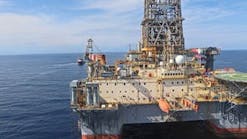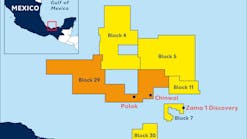Shell made an acceptable offer to swallow up Enterprise, the UK's biggest independent, which had rejected tentative offers from Italy's Eni. The offer price of $10.44 a share represents a premium of 15% on the March 27 closing price of $9. The share price values Enterprise at $5 billion, or $6.2 billion including $1.2 billion of net debt.
"The acquisition represents an attractive incremental transaction that secures for Shell a complementary portfolio of assets with strong operational fit and low risks to performance delivery," Shell said. The deal will increase Shell's total hydrocarbon production by 6% over 2001 levels and will increase reserves by 1.5 Bboe at a competitive acquisition cost of $4/boe for proved and probable reserves, Shell said.
Shell estimates the integration of Enterprise with its existing operations will result in synergies of $300 million a year, including $150 million through operational efficiencies and cost reductions, $120 million through a disciplined choice of exploration prospects, and $30 million in capital expenditure savings. It is thought that 100 to 150 jobs could go at Enterprise, mainly in the UK.
Only two months ago, Sam Laidlaw, Enterprise's newly-recruited chief executive, stressed his belief in the role that independent E&P companies have to play in the industry and his confidence that Enterprise could deliver competitive shareholder returns. Delivering value to shareholders was, he said "the central goal," which could be achieved in a variety of ways. But, selling the company was not one of these.
Now, the directors apparently think differently and "consider the terms of the offer to be fair and reasonable and intend unanimously to recommend shareholders to accept it." Sir Graham Hearne, chairman, said, "It provides the shareholders with a means of realizing a substantial amount of the inherent value in the existing portfolio and accelerates the delivery of shareholder returns."
Enterprise was formed in 1982 by the British government to hold the offshore E&P oil interests of British Gas Corporation and was floated in 1994. It produced 242,796 boe/d last year from 41 fields and has significant operations in the UK, Norway, Italy, Brazil, and the Gulf of Mexico. At the end of last year, it had estimated proven and probable reserves of 1.5 Bboe. It posted total operating profit of $948.2 million.
In the UK, Enterprise will add 30% to Shell's current production and should provide strong support to its medium-term production profile. Enterprise operates the Nelson, Pierce, and Cook fields and has interests in a number of producing fields as well as a portfolio of exploration licenses.
Shell will now get an 18.68% interest the Clair field, which BP is developing West of Shetlands, and will become operator of the Corrib gas field, which Enterprise is developing off the west coast of Ireland. Shell will also gain an interest in a license offshore the Faeroes.
In Norway, Shell's production will increase by 50%. It will gain, among other interests in producing fields, stakes in BP's Skarv project, Statoil's Svale discovery northeast of Norne, and the Idun prospect, close to Skarv, as well as interests in the Barents Sea. Last year Enterprise won its first operatorship offshore Norway with a number of blocks in the Stord Basin.
Shell said in Brazil, Enterprise's development operatorship builds on Shell's commitment to this key region and enhances Shell's holdings in high-potential deepwater blocks. Enterprise is operator of the 170 MMbbl Bijupira-Salema field development, due onstream in 3Q 2003.




